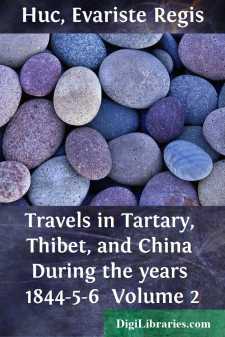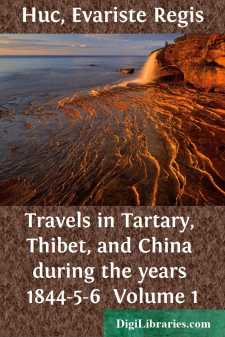Categories
- Antiques & Collectibles 13
- Architecture 36
- Art 48
- Bibles 22
- Biography & Autobiography 813
- Body, Mind & Spirit 142
- Business & Economics 28
- Children's Books 14
- Children's Fiction 11
- Computers 4
- Cooking 94
- Crafts & Hobbies 4
- Drama 346
- Education 46
- Family & Relationships 57
- Fiction 11829
- Games 19
- Gardening 17
- Health & Fitness 34
- History 1377
- House & Home 1
- Humor 147
- Juvenile Fiction 1873
- Juvenile Nonfiction 202
- Language Arts & Disciplines 88
- Law 16
- Literary Collections 686
- Literary Criticism 179
- Mathematics 13
- Medical 41
- Music 40
- Nature 179
- Non-Classifiable 1768
- Performing Arts 7
- Periodicals 1453
- Philosophy 64
- Photography 2
- Poetry 896
- Political Science 203
- Psychology 42
- Reference 154
- Religion 513
- Science 126
- Self-Help 84
- Social Science 81
- Sports & Recreation 34
- Study Aids 3
- Technology & Engineering 59
- Transportation 23
- Travel 463
- True Crime 29
Travels in Tartary, Thibet, and China During the years 1844-5-6 Volume 2
Description:
Excerpt
CHAPTER I.
Caravan of Khalkha-Tartars—Son of the King of Koukou-Noor—Sandara the Bearded—Two thousand Oxen are stolen from the Houng-Mao-Eul, or Long Hairs—Fearful Tumult at Tang-Keou-Eul—Description and character of the Long Hairs—Feasts of the First Day of the Year—Departure for the Lamasery of Kounboum—Arrival at Night—Old Akayé—The Kitat-Lama—The Stammerer—Pilgrims at Kounboum—Description of the Feast of Flowers.
The Houses of Repose are very numerous in the small town of Tang-Keou-Eul, by reason of the great number of strangers, who are drawn thither from all quarters by commerce. It was in one of these establishments, kept by a family of Mussulmen, that we went to lodge. As we had nothing to do with trade, we felt called upon candidly to communicate the fact to the host, and to arrange the terms of our living in his house; it was agreed that we should be there as in a common hotel. All this was very well; but the question was, what we were to do afterwards: what was to become of us? This question incessantly engrossed our minds, and tormented us not a little.
As far as Tang-Keou-Eul we had followed, with sufficient continuity, the route we had traced out for ourselves; we might even say that this portion of our journey had been successful beyond all expectations. Now the business was to carry out our plan, and to penetrate to Lha-Ssa, the capital of Thibet; an undertaking which appeared bristling with almost insuperable difficulties. Tang-Keou-Eul was our columns of Hercules, with their depressing ne plus ultra (No farther shalt thou go). However, we had already vanquished too many obstacles, to be easily overcome by discouragement. We heard that almost every year caravans proceeded from Tang-Keou-Eul, and penetrated into the very heart of Thibet. We wanted nothing more to confirm our determination. Whatever other people had undertaken and executed, we assumed also to undertake and to execute, as not being, probably, beyond our power. It was therefore settled that the journey should be carried out to the end, and that no one should say that Catholic missionaries had less courage for the interest of the faith, than merchants for a little profit. The possibility of departure being thus determined we had nothing to seek but the opportunity.
Our great business, therefore, was to collect all possible information respecting this famous route into Thibet. We heard terrible things about it; we should have to travel for four months through a country absolutely without inhabitants, and should have, accordingly, to lay in before our departure all the necessary provisions. In the season of winter, the cold was so horrible that it often happened that travellers were frozen to death or buried beneath the avalanches of snow; while, in summer, a great number were drowned, for they had to cross large streams, without bridge or boat, without other aid than that of animals, which themselves often could not swim. Moreover, there were hordes of brigands, who at certain periods of the year prowled about the desert and stripped travellers and abandoned them, without clothes or food, amidst these frightful plains; in short, there was no end of stories, enough to make our hair stand on end; and these stories, fabulous as they seemed, or, at least, much exaggerated, were the same on every tongue,—were all of a frightful uniformity. Besides, there were to be seen and questioned in the streets of Tang-Keou-Eul, some Tartar-Mongols, who were standing evidence of the truth of these long narratives, being the remnants of a large caravan, which had been attacked in the preceding year by a troop of brigands. These had contrived to escape, but their companions had been left to the mercy of the Kolo (brigands). This information, while ineffectual to shake our resolution, induced us to remain where we were, until a favourable opportunity for departure should present itself.
We had been six days at Tang-Keou-Eul, when a small caravan of Tartar-Khalkhas arrived at our House of Repose. It came from the frontiers of Russia, and was on its way to Lha-Ssa to offer up its adorations to a young child, which, the people were informed, was the famous Guison-Tamba newly transmigrated. When the Tartars learned that we were awaiting a favourable opportunity for proceeding towards Thibet, they were delighted, fully appreciating the fact that their troop, in this unexpected accession of three pilgrims, received an accession, also, of three combatants in the event of a fight with the Kolo. Our beards and mustachios inspired them with an exalted idea of our valour, and we were forthwith decorated by them with the title of Batourou (braves). This was all exceedingly honourable and seductive; but still, before we finally decided upon joining the cavalcade, we thought it expedient to consider the various aspects of the matter gravely and maturely....



